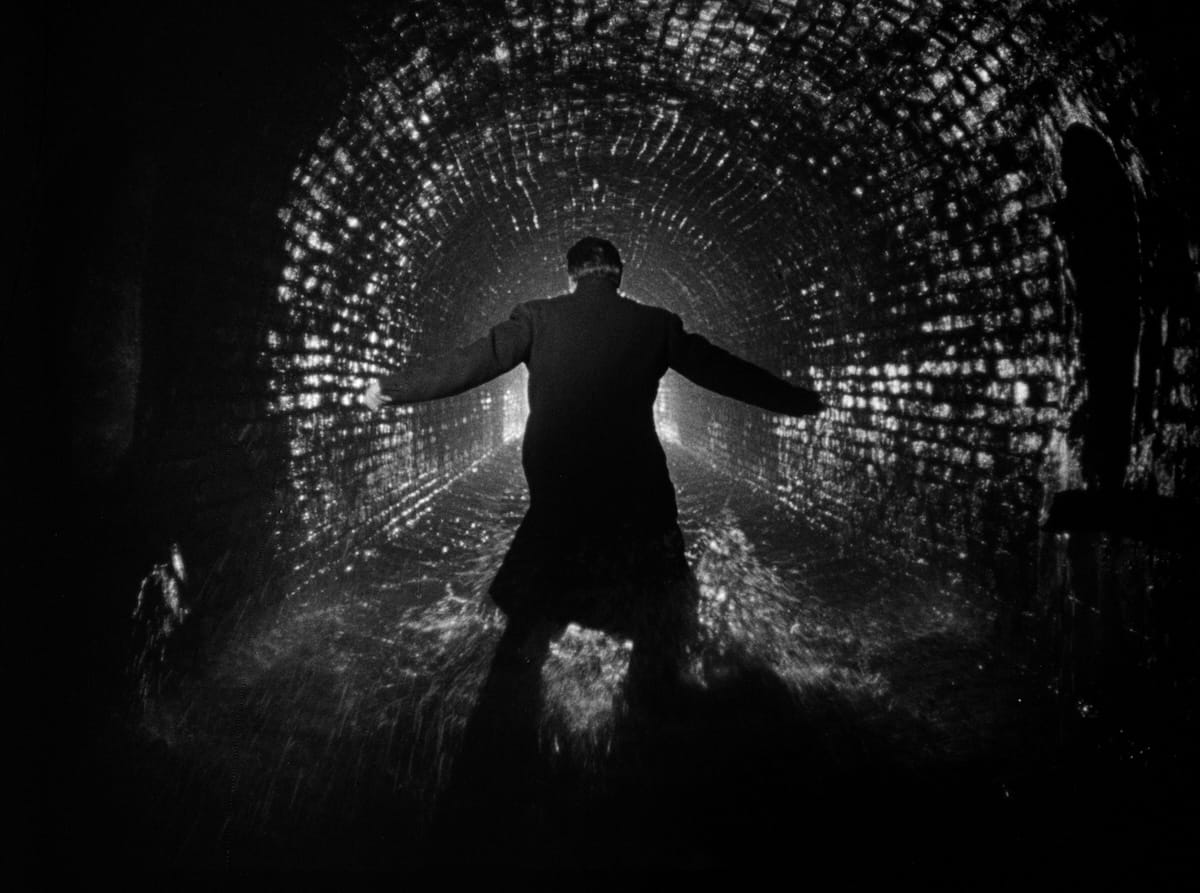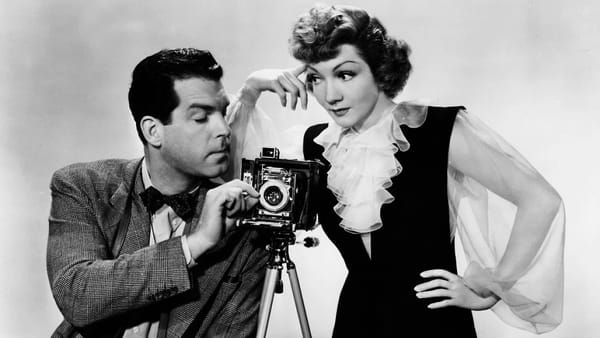Psycho. #52
Caspar has seen things you people wouldn't believe.


Is there such a thing as a critic paradox where you can acknowledge that a film is good but simply not like it?
Of course, but that isn’t paradoxical as such! I am no master of logic, but I’m pretty sure that a paradox, such as Catch-22, or the one about how it’s technically impossible to overtake a tortoise, contains the terms of its own contradiction. The fact of being a critic does not imply liking everything that is ‘good’, not least because nobody has ever arrived at — nobody could ever arrive at! — a workable definition of that term as it relates to art. I’m trying to think what a related paradox might be: maybe, that a critic can never comprehensively explain what ‘good’ art is, but instead only put forward an amalgam of certain artistic strictures and their personal taste, and yet we keep trying. Something along those lines.
I’m currently reading The Bell by Iris Murdoch, which I was hoping to devour, especially after feasting on a particularly tasty introduction by A.S. Byatt, whose books I have always enjoyed and whom I admire as an essayist and woman of letters. (I highly recommend the Byatt-edited Oxford Book of English Short Stories, which includes some real corkers, and particularly, unexpectedly, an absolute hoot of a short story by P.G. Wodehouse) Byatt constructs a brilliant argument in her introduction, hinging on the history of the novel from its apogee in the 19th century through to the 20th century when the very concept of the novel was exploded by modernists. Murdoch, Byatt writes, belongs at once to the tradition of the realist novel, which seeks to be all-encompassing in its scope, and to the later conception of the novel as necessarily subjective and philosophical.
(I’ll get onto the subject of films at some point, don’t worry)

At the same time as picking up The Bell, I was finishing Middlemarch by George Eliot, and I recognised certain similarities, such as the way that Murdoch explicitly tells the reader everything, rather than leaving us to pick things up; she is wholly omniscient, and takes a kind of ironic pleasure in moving her characters about as it suits her, like puppets. And yet, even appreciating the intent behind the book, and seeing it executed successfully, I found that I could not enjoy The Bell: I was irked by clunky descriptions; I found myself tearing my hair out at Murdoch’s flatly descriptive style, which extended to the motivations of her characters; and I longed for something more free-flowing, less programmatic, which might lose in philosophical import but gain in immediacy, freshness, readability.
In other words, I carry my sensibility with me always, as do you. Not to get too Cartesian on your ass, but my intellect only takes me so far in my appreciation of art; it wars with my emotions, my character. Now, I could — if I wanted — try to make an argument that, for some of the reasons I listed above, The Bell is not ‘good’, but the fact is that I do consider the book good, it simply doesn’t shake my tree. The same goes — of course it does — for certain paintings, particularly extremely figurative or geometrical abstract work (I find myself heading for portraiture in most galleries), and buildings and music and books. A friend of mine has an Instagram account that I marvel at, because in it she posts pictures of various bits of architecture and design that delight her, which — far from even disliking — I would never even notice. In Coventry for the weekend, she might notice a beautiful modernist font on the side of a public library; an Arts & Crafts hallway; a stairwell with a banister that spirals just so. I would most likely walk right past all of those things, muttering to whoever I was with that Coventry sucks shit, why is it literally always raining here, it somehow manages to be an even worse Birmingham, etc etc.
One’s eye is trained a particular way: some of it stems, it seems to me, from a natural inclination towards certain things, while some of it is educated into us and some more of it comes from circumstance. Proust writes about his delight upon glimpsing, on a journey, the steeples of churches in the distance:
At a bend in the road I experienced, suddenly, that special pleasure, which bore no resemblance to any other, when I caught sight of the twin steeples of Martinville, on which the setting sun was playing, while the movement of the carriage and the windings of the road seemed to keep them continually changing their position; and then of a third steeple, that of Vieuxvicq, which, although separated from them by a hill and a valley, and rising from rather higher ground in the distance, appeared none the less to be standing by their side.
When I first read that passage I seized some of the writer’s pleasure — particularly the idea of the setting sun bringing a new quality of light on the church spire — but I also reflected that I shared a culture with Proust (growing up in France, visiting churches and cathedrals, being a sissy) which attuned me to his pleasure. Yet I probably missed some of it, in that a church holds no great religious significance to me, and that my culture has been taken over by modern art forms where Proust was a child of paintings and letters. It must therefore be possible to feel almost completely alien to that passage, and the particular pleasure that it describes; the wider pleasure, however, of recognising something that makes our spirit surge, must be common to all of us.

So it is with films. When I watched Kill Bill with my flatmate many years ago, we marked a little pause after the credits had finished rolling, and then said to each other — both of us equally certain that the other person would share in his view — “well that was brilliant” / “well that was fucking awful”. I really do try to see the best in films that I watch, and I hope that I am fair in trying to recognise qualities that others will appreciate but which leave me cold; but that spirit only carries me so far. Last year I caused outrage on the group chat by saying I hadn’t particularly loved The Third Man, on a rewatch: I’ll go further here, and say that it bored me senseless. That doesn’t mean I can’t appreciate its qualities — the classically clipped, terse Graham Greene-ness of dialogue, the wonderful zither score, and the sensational final scenes in the sewer. But I’m not drawn to it, I grew frustrated with its long pauses and the sense of itself as a great meditation; there are scenes involving kafkaesque officialdom that I can’t become interested in, and I find the dialogue posturing. Another one for you: I can’t bear Meet Me in St. Louis (where are the bangers? Why is it all made of cardboard??!) And another: Blade Runner.
I’m fascinated by how editors balance that out: if a film comes out and you have two reviewers available to write about it, one of whom hates it and the other of whom loves it, who should get the job? What duty do we have to the goal of objectivity, even as we recognise it as unachievable? Sometimes, by working extremely hard at a film or book or painting, I find I can even — on occasion, and up to a point! — override my deeply personal inclinations, because I have found a way into the piece, some way to illuminate it which I can square with myself; it then sits there, considered and admired, in a different part of my selfhood, this contested object, separate to my innermost pantheon, a little rusted, a little battered, but gleaming here and there. This, this is good: and I have worked out a way to consider it so, which is true to my principles and convictions, which is thought-through and appealing, and yet which somehow still sits a little exterior to my purest tastes.
Although I think we have some duty to fairness, and there is value in moderation, I appreciate critics who come out swinging, and who say: this is my sensibility, and this is why my sensibility, in this case, is right. Have some guts and stick up for yourself, and try to find an argument to back up your views! Others may disagree, and that is their prerogative — nobody’s opinion ever harmed anybody else’s — but what counts is believing it. Feel it, give it a quick once over with your brain, and then back it up with words, my friend, back it right up and get it out there to live a life of its own.
Send your questions anonymously to Caspar at this link, no personal information is collected.



